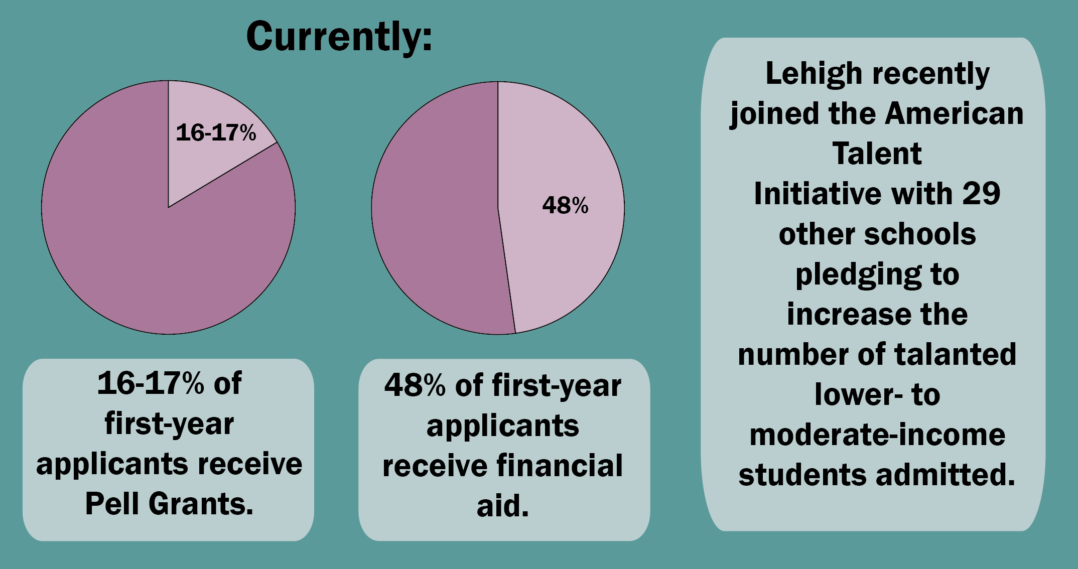
Designed by Anna Simoneau
Lehigh has joined 29 other schools in the American Talent Initiative (ATI) to increase its number of talented, lower- and moderate-income students.
Set up by Bloomberg Philanthropies, ATI’s goal is to admit more talented low-income students to colleges and universities with consistently high graduation rates. Bruce Bunnick, interim vice provost for undergraduate admissions, said this will add to recent efforts made by the university to reflect the diversity in society.
In September 2016, President John Simon was asked by a representative of Bloomberg Philanthropies to become part of this initiative.
Simon, Bunnick and Ira Rubien, the associate vice president of marketing and communications, will meet in New York on Feb. 22 with the 29 other schools to discuss procedures and how data will be collected.
“The greater imperative here is, I think we have an obligation of higher education to reach out to a large amount of students who might not consider a college degree or college experience,” Bunnick said.
He said students may think the idea is out of reach for different reasons such as cost. Bunnick thinks this initiative will eradicate the financial burden for some families.
“The cost right now (to attend Lehigh) is over $63,000, and that sticker price is somewhat prohibitive,” said Jason Shumaker, senior associate director of financial aid.
He said what people should look at is the net price of attendance after receiving financial aid packages. Shumaker said although the initiative may, in theory, mean the financial aid need for students will increase, Lehigh will still try to meet 100 percent of need-based financial aid. He said he encourages Lehigh being a part of ATI to promote the university’s own views.
“I think it’s a positive commitment that reinforces the initiatives of Lehigh and of the financial aid office, but it’s bigger than financial aid,” Shumaker said. “It is committing to a need-based financial aid program and having a diverse student body representing all kinds of diversity.”
Bunnick said Lehigh has already been trying to diversify the students admitted based on socioeconomic background.
“I think we’re doing a very good job, especially since I arrived at Lehigh 20 years ago,” Bunnick said. “However, I think we still have a long way to go and have new obligations we need to meet.”
Lehigh Admissions is need-blind when looking at student applications. Bunnick said they would have to use other methods to try to include a more diverse socioeconomic background of students.
Bunnick said that over the past eight to 10 years, Lehigh has become increasingly aligned with community-based organizations, especially in the east. These organizations, he said, are a way for students in places like inner-city schools to get counseling for applying to colleges they may otherwise not have.
“I think we’re going to increase our own efforts, not only to attract these students but also to retain them,” Bunnick said.
Low- or moderate-income students are eligible for a variety of financial aid programs. Among them are the Pell Grants, Shumaker said. Pell Grants are federal grants that Lehigh administers on behalf of the federal government.
Bunnick said 16 to 17 percent of first-year students receive Pell Grants. In addition, 48 percent of Lehigh first-years qualify for financial aid. However, Bunnick said this could either be a small or large amount of money depending on the student’s level of need.
“We don’t have an infinite financial budget,” Shumaker said, “so as the demographic of the United States and the 99 percent grows, and if all students qualify for financial need and apply on time, then I think we will have to change need-based financial aid.”
The Lehigh Fund is comprised of donations from Lehigh alumni and others to benefit the university. One of the ways it does this is by using the money for financial aid. Chad Davis, senior director of the Lehigh Fund, said the donations help talented students get the aid they need.
“I think (ATI) is a great example of why supporting financial aid is important,” Davis said.
He said Lehigh joining the American Talent Initiative will not change the need for gifts, but it shows how alumni can make an impact on students’ education.
Bunnick said ATI is still in its early planning stages. Lehigh is still figuring out how it will do its part in assuring more low- to moderate-income students are accepted to the university as well as how data will be collected.
Bunnick said he hopes students will appreciate Lehigh’s efforts in diversifying its student population in terms of income, because as he says, “college is a living lab for learning.”





Comment policy
Comments posted to The Brown and White website are reviewed by a moderator before being approved. Incendiary speech or harassing language, including comments targeted at individuals, may be deemed unacceptable and not published. Spam and other soliciting will also be declined.
The Brown and White also reserves the right to not publish entirely anonymous comments.